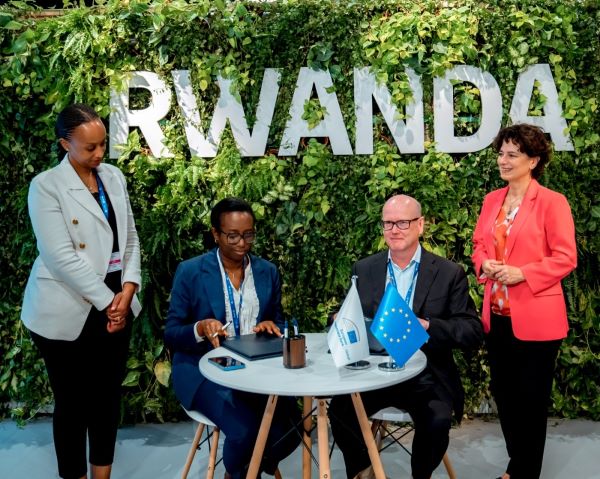
The European Investment Bank (EIB) and the Bank of Kigali have outlined a new €100 million finance initiative aimed at enabling Rwandan smallholder farmers adapt to climate change.
According to the partnership signed between the two financial institutions on the id3lines of the ongoing COP28 event in Dubai, the initiative will provide the needed boost to smallholders, businesses, and enterprises dependent on climate-vulnerable agriculture across the East African nation.
This is in addition to improving access to finance by businesses owned by women.
“I am glad to witness additional investment towards this initiative which is in line with our aim to achieving ambitious climate action plan to reduce carbon emissions by 38% by 2030. Achieving this goal will require $11 billion and we encourage everyone to be part of this initiative. BK has paved the way for commercial banks in Rwanda in incorporating green financing”, said Teddy Mugabo, CEO at Rwanda Green Fund.
In the upcoming initiative set to commence early next year, farmers, agribusiness entities, and agricultural cooperatives are poised to gain access to €100 million in fresh financing. This funding will be facilitated through a collaboration between the EIB and the Bank of Kigali.
Credit limitations
The primary objective of this initiative is to address persistent credit limitations hindering private sector investment in agriculture. It aims to achieve this by streamlining access to specialized, long-term loans.
The implementation of this initiative will be carried out in close partnership with the European Union, which actively supports agriculture programs in Rwanda. These programs, notably focused on horticulture and aquaculture, aim to enhance value chain development in the region.
Dr. Diane Karusisi, CEO of the Bank of Kigali, emphasized the far-reaching effects of climate change on both agricultural production and the overall economic stability of agribusiness in Rwanda. Stressing the importance of financial access in building resilience and safeguarding livelihoods amidst the climate emergency, she highlighted the collaborative efforts of experts from the Bank of Kigali and the EIB in formulating a comprehensive private sector financing scheme.
“This scheme is designed to expedite climate change adaptation, promote sustainable development, and create economic opportunities, particularly for women.”
Climate resilience
Thomas Östros, Vice President of the European Investment Bank, underscored the significance of increasing financial access for smallholders and agribusiness throughout Rwanda.
Recognizing its critical role in enhancing climate resilience, he emphasized that such access enables millions of farming families to embrace sustainable agricultural practices, thereby mitigating the impact of climate change.
Östros expressed the European Investment Bank’s satisfaction in partnering with the Bank of Kigali and the European Union to develop this innovative EUR 100 million initiative, as part of the Global Gateway partnership.
Jutta Urpilainen, European Commissioner for International Partnerships, remarked that the collaboration between the European Investment Bank and the Bank of Kigali, supported by the European Union, exemplifies the dedication of financial partners in addressing the repercussions of the climate emergency. This partnership underscores their commitment to assisting vulnerable communities facing the threats of climate change.
Improving access to finance
Improved access to finance will also help small holders and agribusiness to diversify income sources, strengthening resilience against climate-induced shocks and creating more sustainable livelihoods.
In Rwanda, the gender gap in agricultural loan access is pronounced, as 74.5% of men have access compared to only 25.5% of women, disproportionately affecting women-owned or led agribusinesses. Despite approximately 71% of women in employment working in agriculture in Rwanda.








[…] EIB, Bank of Kigali outline €100 million finance plan to enable smallholders adapt to climate chan… […]
[…] EIB, Bank of Kigali outline €100 million finance plan to enable smallholders adapt to climate chan… […]
Comments are closed.